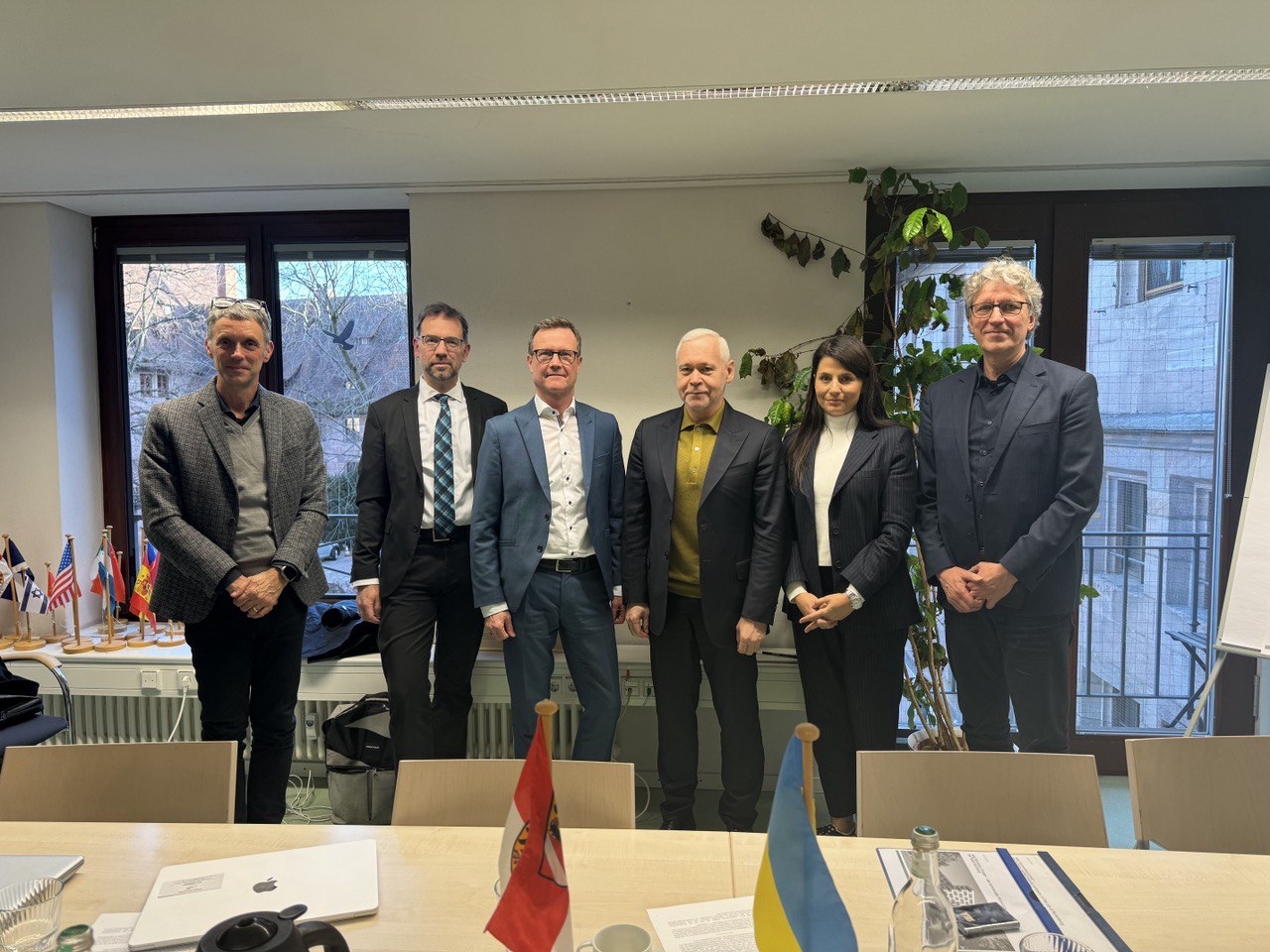News
News & Events
7 February 2024
Knowledge exchange
Mayor of Kharkiv Terekhov met with the Head of WBG Nuremberg

Representatives of WBG Nuremberg, City of Nuremberg and Kharkiv and IWO.
Picture: ©City of Kharkiv
Visit to Nuremberg (Germany)
During his official visit to Kharkiv’s Twin City Nuremberg, the Mayor of Kharkiv Mr. Ihor Terekhov, had a meeting with the city officials and housing sector representatives in order to learn about Nuremberg’s best practices towards affordable housing provision. The meeting was facilitated by IWO e.V. Executive Board Member Knut Hoeller and organized within the framework of the “Municipal Housing in Kharkiv: Affordable Rental Models for Housing Recovery in Ukraine” project, which aims to develop a viable rental housing program for the city of Kharkiv. This program will be implemented by the city of Kharkiv within the UNECE UN4UkrainianCities Project and in partnership with IWO e.V. The UN4UkrainianCities project is funded by the German Federal Ministry for Economic Cooperation and Development (BMZ) and supported by the Deutsche Gesellschaft für Internationale Zusammenarbeit (GIZ).
Representing Nuremberg, the Deputy Mayor of Nuremberg councilor for Planning and Building Daniel F. Ulrich, presented the city’s urban development and demographic trends, housing policy, spatial planning approaches and concrete housing projects. He noted that as Nuremberg is growing, the city’s leadership is taking a leading role in affordable housing provision, as well as climate adaptation policies and efforts to implement greener policies.
The Head of the Nuremberg’s municipal housing company WBG Mr. Ralf Schekira presented the company, which is a key player of city’s housing economy. He focused on its juridical and organizational structure, financial performance, typical schemes to finance new construction and shared WBG’s experience with managing European funds. Moreover, he highlighted the importance of construction of affordable apartments (for Nuremberg, it’s around 20% below the market rental price) and meeting sustainability goals, both as an added value for the city and its citizens as well as for accessing the low-interest European loans. Sustainability goals for the affordable housing requirements of European finance institutions includes energy-efficiency, clean sources of energy, affordable rent, inclusive housing to address marginalized groups, transparent governance, and economic stability.
Head of Architecture and Construction Department of WBG Marcus Schulz presented latest WBG’s housing projects, focusing on construction, and engineering aspects. WBG’s know-how includes a project of typical prefabricated house, which is suitable for “infill development”. Moreover, he shared that company’s role is also to revitalize strategic spots in the city, as it was in WBG's MONOPOL491 project, while simultaneously providing access to affordable rental apartments.
Through the discussion, Mayor Terekhov gained a clearer understanding of the role of the WBG municipal housing company in ensuring affordable and inclusive access to housing in the city. As such, he confirmed that the framework is of great interest for Ukraine. Many challenges, however, are to be overcome, including the acquisition of financing under the conditions of ongoing war.
Mr. Terekhov emphasised that the city of Kharkiv is prepared to implement new forms of housing provision, which is necessary to address the fact that 150,000 residents have lost their homes. However, the provision of such housing first requires appropriate and favorable legal conditions to be established.
In this light, Mr. Schekira identified that the WBG’s finance scheme could be useful for Kharkiv. A key aspect he highlighted was the preferential provision of land plots by the city to the WBG. Typically, approximately 20% of a project costs are own capital of WBG, 30% are low-interest loans from the Council of Europe Development Bank (CEB). These European loans enable the company to obtain further 30% of funding from private commercial banks. The remaining 20% are grants from the Free State of Bavaria and the Federal Government. This scheme enables the construction for low-income households at rents well below the market level Mr. Schekira emphasised that WBG does not receive any money from the city. The municipal housing company works like a commercial player on the housing market but has much better access to city’s land plots provided it create affordable housing for city residents.
Through the “Municipal Housing in Kharkiv: Affordable Rental Models for Housing Recovery in Ukraine” project, the two cities will continue to deepen their collaboration at the municipal level and explore the feasibility of adopting Nuremberg’s housing framework to Kharkiv’s unique context.
For further information, please contact Yuliia Popova at popova@iwoev.org.